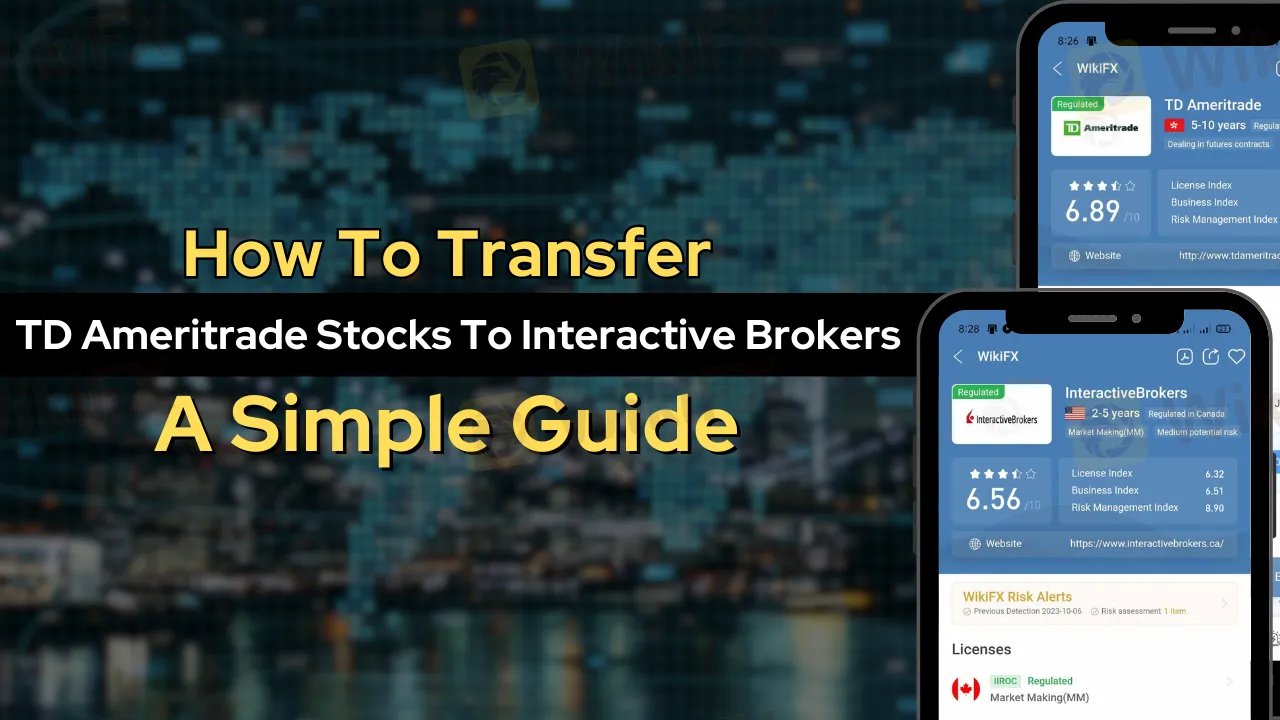简体中文
繁體中文
English
Pусский
日本語
ภาษาไทย
Tiếng Việt
Bahasa Indonesia
Español
हिन्दी
Filippiiniläinen
Français
Deutsch
Português
Türkçe
한국어
العربية
How To Transfer TD Ameritrade Stocks To Interactive Brokers: A Simple Guide
Abstract:Navigating TD Ameritrade's recent service changes in Singapore? Discover a step-by-step guide to effortlessly transfer your assets to Interactive Brokers (IBKR). Learn about both platforms and ensure a smooth transition for your investments. Make informed decisions for hassle-free trading!

Introduction
With recent changes to TD Ameritrade's Singapore services for non-accredited investors, many are scrambling to find alternative platforms to keep their assets. One such viable option is Interactive Brokers (IBKR). If you're among those who are considering making this move, this article provides a detailed guide on how to transfer your stocks and assets seamlessly.

A Brief About TD Ameritrade and Interactive Brokers
TD Ameritrade is a renowned broker-dealer that offers an electronic trading platform for trade in financial assets. On the other hand, Interactive Brokers is a multinational brokerage firm known for its advanced trading platform and comprehensive offerings. Both brokers have garnered respect and trust for their adherence to regulations and their commitment to providing robust platforms for traders and investors.
TD Ameritrade

Interactive Brokers

The Need to Transfer
The recent announcement about TD Ameritrade Singapore discontinuing services for non-accredited investors has made it imperative for many to seek an alternative. IBKR stands out as a promising option.
Setting Up an IBKR Account
If you're new to Interactive Brokers, you'll first need to set up an account. For a detailed tutorial on how to do this, refer to expert videos or the official IBKR guide. Once your account is active, the transfer process can commence.
Steps to Transfer Your Assets
Accessing the IBKR Web Portal: Begin by logging into your IBKR account. Navigate to the 'Transfer & Pay' section, and from there, click on 'Transfer Positions'. You'll see an option to 'Transfer Assets into your IBKR account' - select it.
Choosing the Transfer Region: Despite transferring from TD Ameritrade Singapore, select 'United States' as the region. This is because TD Ameritrade uses the Automated Customer Account Transfer Service (ACATS) for transferring USD assets like US equities, US options, and US fixed income.
Inputting TD Ameritrade Details: Upon selection, choose 'TD Ameritrade' and then enter your TD Ameritrade account number. You can find this number in the 'Account Statements' section of your TD Ameritrade account.
Further Details: For account type, most individuals will select 'Individual Account'. Skip the tax identification number section, and when asked about saving broker information, choose 'no'.
Transfer Details: To ensure that TD Ameritrade waives the fees, select 'Yes' for transferring all assets. Mutual funds not supported by the transfer will be removed, so authorize this action. Make certain that you aren't transferring any US micro-cap stocks, as IBKR doesn't support them. If in doubt, you can verify whether your stocks fall under this category.
Finalize the Transfer: After ensuring all information is accurate, digitally sign to confirm the transfer. The transfer typically takes between 4 to 8 business days.
Checking Transfer Status: To monitor the transfer progress, navigate back to 'Transfer & Pay' and then to 'Transaction Status & History'.
A Few Tips
During the transfer period, it's advised not to make any buy or sell transactions on both TD Ameritrade and IBKR to avoid complications.
In Conclusion
The transfer process from TD Ameritrade to IBKR is quite straightforward. With a little care and attention to detail, you can easily move your assets and continue trading without any hitches. Safe trading!

Disclaimer:
The views in this article only represent the author's personal views, and do not constitute investment advice on this platform. This platform does not guarantee the accuracy, completeness and timeliness of the information in the article, and will not be liable for any loss caused by the use of or reliance on the information in the article.
Read more

Nonfarm Data Lifts Market Sentiment, U.S. Stocks Rebound Strongly
U.S. nonfarm payrolls for May slightly exceeded expectations, stabilizing investor sentiment and easing fears of a hard landing. This upbeat data sent U.S. equities broadly higher, led by tech stocks, with the Dow and S&P 500 posting significant gains. However, behind the optimism lies a fresh round of market debate over the Federal Reserve’s rate path, with uncertainty around inflation and interest rates remaining a key risk ahead.

OctaFX Flagged by Malaysian Authorities
OctaFX has been officially listed on warning lists by both Bank Negara Malaysia (BNM) and the Securities Commission Malaysia (SC). These alerts raise serious concerns about the broker’s status and whether it is legally allowed to operate in Malaysia.

Errante Broker Review
Established in 2020, Errante has rapidly gained recognition in the forex and CFD trading industry. With a commitment to transparency, client protection, and a diverse range of trading services, Errante caters to both novice and experienced traders. This review provides an in-depth look at Errante's offerings, regulatory standing, trading conditions, and more.

IronFX Broker Review 2025: A Comprehensive Analysis of Trustworthiness and Performance
IronFX Review 2025: Explore the broker’s AAAA WikiFX rating, global regulations, and $500,000 trading prize. Is it trustworthy or a scam? Dive into our transparent analysis!
WikiFX Broker
Latest News
OctaFX Flagged by Malaysian Authorities
IronFX Broker Review 2025: A Comprehensive Analysis of Trustworthiness and Performance
Nonfarm Data Lifts Market Sentiment, U.S. Stocks Rebound Strongly
Why Your Worst Enemy in Trading Might Be You
Errante Broker Review
Currency Calculator


